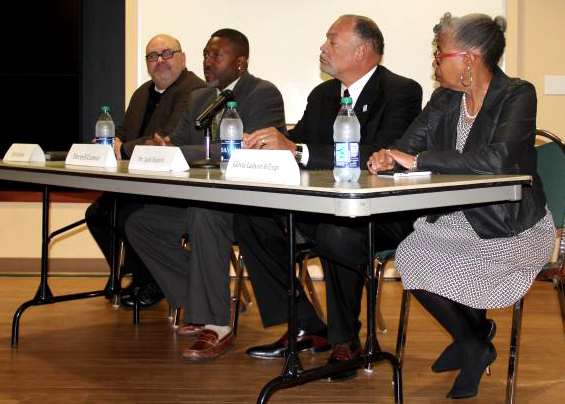
Local journalists, education leaders and experts gathered last Thursday at a panel hosted by the Simpson Street Free Press, a mission-oriented youth newspaper dedicated to raising student achievement to discuss Madison’s persistent racial achievement gap.
“We’re in crisis,” Gloria Ladson-Billings said at the forum held at Edgewood College.
Panelists discussed the language differences between characterizing disparities in education as an opportunity gap versus an achievement gap.
Ladson-Billings argued that in addition to the historic, economic and political discrimination African Americans have faced, there is a “moral debt that the nation has accumulated” that is not adequately expressed when discussing the achievement gap.
“To call it a ‘gap’ does not give it the gravitas it needs … it is not nagging, it is persistent, it is structural,” she said. “We’re at a point where we cannot go failing another generation of people.”
Madison resides in Dane County, which a 2013 report detailed as having some of the most pervasive and persistent racial disparity gaps on a variety of indicators including poverty, incarceration rates and academic achievement, and reflects the state’s poor academic achievement gap record.
The latest test scores from the National Assessment for Educational Progress, known as the Nation’s Report Card, rank Wisconsin’s gap between black and white students as the worst in the nation excluding Washington, D.C.
Derrell Connor, a WIBA radio talk show host and a Verona School Board member, said the term “achievement gap” is overused.
“It is an opportunity gap, and it is one that we seriously need to examine and figure out how do we make sure all of our kids have the opportunity to succeed to get the best education possible,” Connor said.
In addition to Ladson-Billings and Connor, experts on the panel included Jack Daniels III, Madison College president, and James Kramer, executive editor of the Simpson Street Free Press.
Journalists on the panel included Scott Milfred, the editorial page editor at the Wisconsin State Journal; Deidre Green, Simpson Street Free Press managing editor; Michelle Li, evening news anchor for WISC-TV Channel 3; and Jorge Isaac Zeballos, the assistant editor at La Comunidad News.
Despite Wisconsin’s dismal achievement gap record, experts were able to identify possible solutions that raise student achievement.
Ladson-Billings said if a student has a qualified teacher for three years in a row, achievement will improve. She identified methods that work such as constantly reinforcing to students that they can and will succeed, strengthening connections to parents and prioritizing a safe, structured learning environment for students.
As a college president, Daniels said he is concerned with the transition from high school to higher education and piquing the interest of students to pursue a variety of careers. Kramer emphasized out-of-school learning opportunities that reinforce basic skills like reading and writing are critical.
Poverty and achievement gaps often go hand-in-hand, but Connor said he thinks putting all the focus on poverty can hinder efforts to raise student achievement.
“We get to the point where we are crippling kids,” Connor said. “It’s to the point that people are going to throw our hands up and say as soon as we get rid of this poverty issue, we can tackle [the achievement gap issue].”
But conquering the achievement gap is not “insurmountable” or “unsolvable,” Ladson-Billings said.
“I tell people all the time I am three generations out of chattel slavery, two generations out of sharecropping, a generation out of legal apartheid … helping some kids read and write and compete is really not the hardest thing my folks have done,” Ladson-Billings said.



























